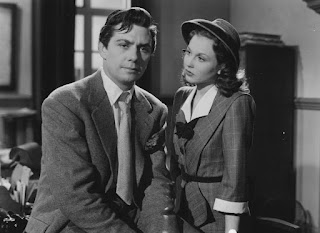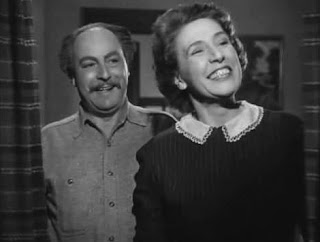Directed by Arthur Crabtree; produced by Betty E Box
Businessman Lee Warren (Eric Portman) returns to London, after eight months away, with a plan to kill the lover of his wife, Vivien (Greta Gynt). As the crime is being committed, however, the scheme goes awry – but not to Warren’s disadvantage. However, getting away with murder – or is it murders? – is only the beginning of the twists in this story.
A successful crime-story based on a successful play, Dear Murderer hides its stage origins well by numerous changes of scenes and plenty of movement among the actors. This is a credit to the director, but the laurels for an entertaining film go principally to the actors and the script, which reportedly stayed very close to the play’s.
Eric Portman may not be remembered as well as he should be today, but this interesting actor gave quality performances in many movies, a number from the production/direction team of ‘The Archers’ (Michael Powell and Emeric Pressburger). His superior elocution and haughty expressions often led him to portray arrogant Europeans, especially Germans, though he was, in fact, born in Yorkshire. Here, he walks a fine line: clearly a remorseless killer, he almost slips into the viewer’s sympathy. His motive, at least at the start, is understandable, and his resolve may not be as strong as he believes.
Gynt is also very good, but appreciation of her work in Dear Murderer may not be immediate. Indeed, her character is rather annoying initially; count the number of times she calls her husband and boyfriend ‘darling’. But there is more to Vivien Warren than a superficial desire for pleasure. Or is there?
The two younger secondary players, Maxwell Reed and Hazel Court, are weak links in the cast’s chain, and it’s not surprising that they eventually moved into filling a large number of guests spots on television series, though Reed had his own series for a few years. The pair portray their characters adequately, but no more.
Dennis Price has an unexpectedly small – though pivotal – part to play, while Jack Warner could fill his rôle as the investigating police officer in his sleep. (He played the very popular title cop in tv’s Dixon of Dock Green for 21 years, until he was 81!)
The story is clever and complex, without being complicated. Viewers won’t be able to guess where it will end up, and along the way will see a cat-and-mouse game with more than one mouse – and more than one cat. Not many plots feature a character trying to make a murder that was meant to look like suicide, look instead like a suicide that was murder.
The script provides the ingredients, as it were, for Portman and Gynt’s feast. The dialogue is sharp, even witty: at one point, the disillusioned Warren asks rhetorically why his mother-in-law always writes to him for permission to visit, answering himself, “Maybe she thinks I’m kinder-hearted than her daughter.”)
Dear Murderer is an excellent movie about how the best-laid plans don’t always work out, even when they do.






























